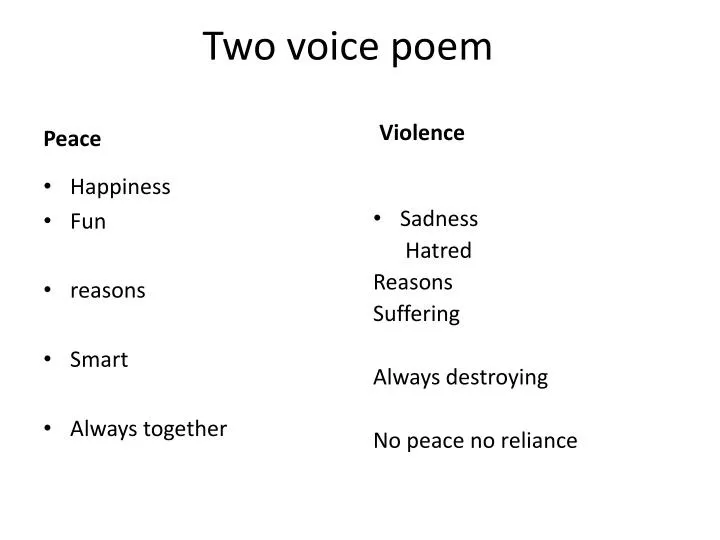Have you ever imagined stepping into another person’s shoes, experiencing their joys and sorrows, their fears and hopes? That’s the magic of a two-voice poem, where two distinct narratives intertwine, creating a tapestry of shared experiences. One such poetic masterpiece is “Salva and Nya,” a powerful exploration of survival, resilience, and the profound human connection amidst the backdrop of the Sudanese civil war.

Image: www.slideserve.com
This poignant poem, penned by Linda Sue Park, doesn’t just tell two separate stories; it weaves them together, creating a symphony of suffering and hope. Salva, a young Dinka boy, is forced to flee his village, embarking on a perilous journey across war-torn Sudan. Nya, a young Sudanese girl, faces a daily struggle for survival, walking miles each day to fetch water for her family. Though miles apart, their destinies are tragically interwoven, highlighting the universal experiences of displacement, hardship, and the indomitable human spirit.
The Two Threads of Destiny: Salva and Nya
Salva’s Journey: A Refugee’s Odyssey
Salva’s story unfolds with the urgency of a fleeing heart. Park captures the visceral fear and uncertainty that gnaws at Salva’s young soul as he witnesses the brutality of the war. “The sound of gunfire, the smell of smoke, the sight of dead bodies,” these images linger in Salva’s memory as he joins a group of refugees, their faces etched with the pain of loss and the longing for a safe haven. The poem portrays his journey as a relentless struggle for survival, a testament to the raw strength that resides within even the most vulnerable.
As Salva traverses the harsh terrain, the landscape mirrors his internal turmoil. “The sun beat down on his head, the dust choked him, the thirst gnawed at his insides.” These sensory details paint a vivid picture of Salva’s suffering, mirroring the hardships faced by countless refugees around the world. Yet, amidst the despair, Salva holds onto hope, fueled by the memory of his family and the unwavering belief that he will one day find a place to call home.
Nya’s Struggle: The Burden of Water
Nya’s journey is grounded in the mundane, the daily grind of survival. Park masterfully portrays the Sisyphean task of fetching water, a task that defines Nya’s life. “The sun beat down on her back, her feet ached, her throat was dry.” Nya’s struggle is both physical and emotional, reflecting the unseen burdens borne by millions living in water-scarce regions. Her journey reveals the resilience of those who carry the weight of poverty, scarcity, and hardship.
Unlike Salva’s journey, Nya’s world is confined by routine. The poem captures the monotony of her life, where every day mirrors the last, filled with the same challenges and the same weary exhaustion. Yet, within this routine, Nya discovers a strength and a determination that defy the limitations of her circumstances. The poem shows us that even in the most mundane tasks, there is the potential for growth, for finding meaning and purpose.

Image: www.teachwriting.org
Converging Narratives: The Power of Connection
The poem’s brilliance lies in how the seemingly disparate narratives of Salva and Nya eventually intersect, weaving a tapestry of interconnectedness. Through a series of events, Salva finds himself at a refugee camp, receiving the gift of education, a lifeline that offers him a future. This opportunity is made possible by the tireless efforts of those who fight for the well-being of refugees, such as the ‘Dinka’ who provide Salva with the chance to learn and thrive.
Nya’s world expands as the village receives a water pump, a technological marvel that transforms the way they access water. This change, brought about by the dedication of those who strive to improve water accessibility, is a beacon of hope for Nya and her community. She finds solace in the knowledge that her daily struggles are slowly easing, a testament to the power of collective action.
The Unifying Thread: Hope
Throughout their separate journeys, both Salva and Nya face unyielding challenges. Yet, there is a core thread of hope that binds them together. Salva, despite the horrors he has witnessed, retains the belief that he will find a better life, fueled by the memory of his family and the love that connects them. He holds onto the hope that he will one day return to his homeland, a belief that propels him forward.
Nya, burdened by the constant struggle for water, finds hope in the small victories, in the knowledge that her village is slowly improving and their lives are becoming easier. Her resilient spirit, fueled by the love for her family and the unwavering commitment to her community, fuels her resolve to persevere. Their journeys, though physically miles apart, are intertwined by this shared determination, a testament to the resilience of the human spirit.
Beyond the Poem: The Power of Sharing Stories
The “Salva and Nya” poem is more than just a literary work; it’s a call to action. By shedding light on the experiences of refugees and those living in poverty, the poem encourages readers to engage with these issues on a deeper level. It challenges us to actively contribute to solutions, to support organizations like the ‘Dinka’ who alleviate suffering and provide essential services.
The poem reminds us that human connection knows no bounds. Even in the face of immense hardship and cultural differences, Salva and Nya’s stories demonstrate the power of shared humanity, reminding us that we are all interconnected and capable of empathy and compassion. By reading and reflecting on “Salva and Nya,” we are inspired to recognize the strength in diversity, to challenge societal biases, and to strive for a more just and equitable world.
Salva And Nya Two Voice Poem
https://youtube.com/watch?v=qIYzgR1Zgm4
In Conclusion: A Poem for the Ages
The two-voice narrative of “Salva and Nya” is more than just a story; it’s a reflection of the human condition. It’s a testament to the resilience of the human spirit, the power of hope, and the profound impact of connection. By immersing ourselves in this poetic journey, we are challenged to examine our own perceptions, to embrace empathy, and to recognize the importance of contributing to a world where all individuals have the opportunity to thrive. So, let this poem serve as a reminder of the shared human experience and inspire us to act with compassion and purpose, making a difference in the lives of others.






